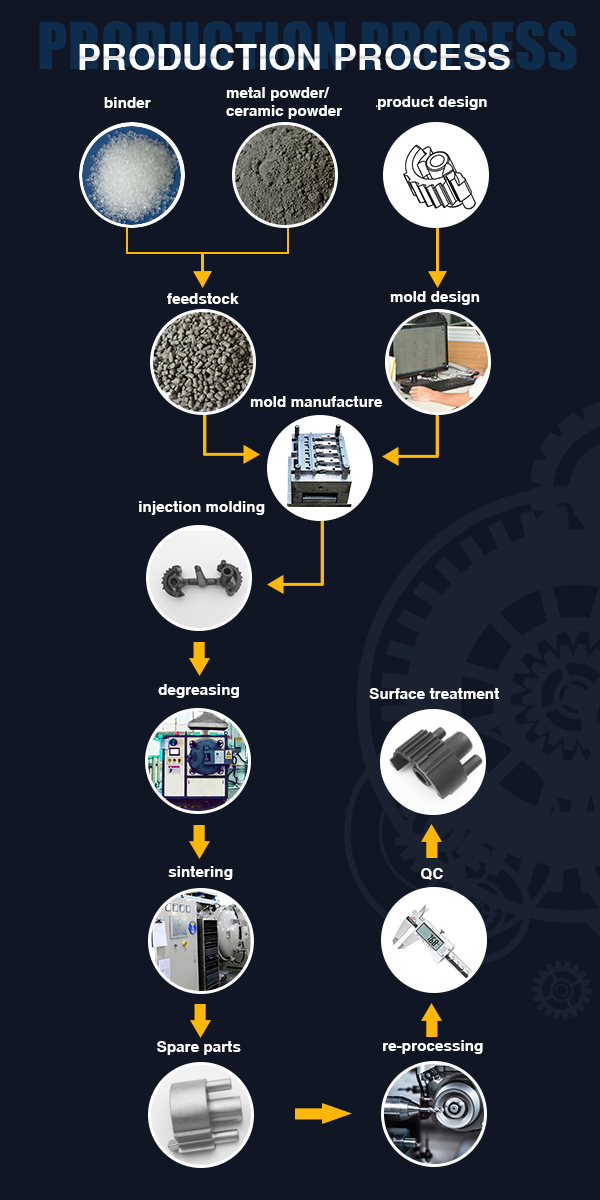The Power of Metal Injection Molding Technology
Metal Injection Molding (MIM), an advanced powder metallurgy process, has become a cornerstone of modern manufacturing. By blending plastic injection molding’s design flexibility with metallurgical precision, MIM produces complex, high-strength parts at scale. From life-saving medical devices to high-performance automotive components, MIM applications are reshaping industries.

How Metal Injection Molding Works: A Quick Technical Overview
MIM combines four key stages to create precision metal parts:
- Feedstock Preparation: Fine metal powder (15-25µm) mixed with polymer binders.
- Molding: Injection into molds under 100-200 MPa pressure.
- Debinding: Removal of 90% binders via solvents or thermal processes.
- Sintering: Final densification at 1,300-1,500°C, achieving >95% density.
Key Advantages:
✅ ±0.3% dimensional accuracy
✅ Surface roughness as low as Ra 1.2µm
✅ Cost-effective for 10k-1M+ annual volumes
Top 5 MIM Applications Across Industries
1. Medical & Dental Innovations
- Surgical Instruments: Scalpel joints, forceps, and biopsy jaws with sterile surfaces.
- Orthopedic Implants: Titanium alloy spinal cages and bone screws (biocompatible ASTM F2885 compliance).
- Dental Braces: Custom brackets with 0.05mm precision.
Case Study: Stryker’s MIM-produced surgical staples reduced assembly steps by 60%.
2. Automotive Breakthroughs
- Fuel Systems: High-pressure injector nozzles (1,200 bar resistance).
- Transmission Components: Gear hubs with 98% density and HRC 50 hardness.
- Sensor Housings: EMI-shielded enclosures for ADAS systems.
Market Impact: 22kg of MIM parts per electric vehicle (Daimler 2023 Report).
3. Consumer Electronics
- Smartphone Mechanisms: Hinge assemblies for foldable screens (500k cycles durability).
- Wearable Devices: Stainless steel watch cases with polished finishes.
- Connector Pins: 0.2mm-diameter contacts for 5G routers.
(Image suggestion: MIM smartphone hinge close-up)
4. Aerospace & Defense
- Turbine Blades: Nickel alloy components with 1,000°C thermal stability.
- Weapon Systems: Tungsten alloy penetrators (18g/cm³ density).
- Satellite Components: Aluminum-matrix RF shields.
Performance: MIM parts achieve 30% weight savings vs. CNC machining.
5. Industrial Tooling
- Drill Bits: Cobalt-bonded cutting edges (ISO 13399 compliance).
- Valve Components: Corrosion-resistant 17-4PH stainless steel seats.
- Molding Inserts: Conformal cooling channels for 40% faster cycle times.
Why Choose MIM Over Alternatives?
| Factor | MIM | CNC Machining | 3D Printing |
|---|---|---|---|
| Cost (10k units) | $4.50/part | $18.00/part | $12.00/part |
| Lead Time | 8-10 weeks | 2-4 weeks | 3-5 weeks |
| Surface Finish | Ra 1.2µm | Ra 0.8µm | Ra 15µm |
| Max Complexity | High (undercuts OK) | Moderate | Very High |
Best For:
- MIM: High-volume, small-to-medium complexity parts.
- CNC: Prototypes or ultra-high precision.
- 3D Printing: Fully custom, low-volume designs.
Future Trends in MIM Technology
1. Material Innovations
- Bioabsorbable Alloys: Magnesium implants that dissolve post-healing.
- MIM Graphene Composites: 30% lighter with enhanced conductivity.
2. Sustainability Gains
- 95% powder reuse rates.
- Water-based debinding cuts VOC emissions by 70%.
3. Digital Integration
- AI-driven sintering optimization reduces energy use by 25%.
- IoT-enabled molds predict maintenance needs.
